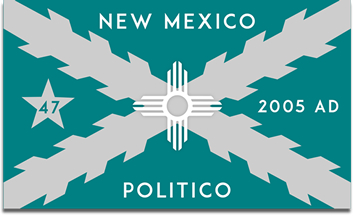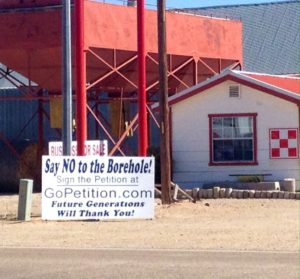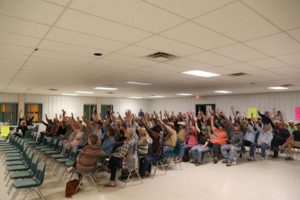ONE MONTH AGO Quay County Commissioners rescinded Resolution 27, reversing their support for Enercon’s proposal to drill a deep borehole in Nara Visa, NM, to test nuclear storage capabilities. Enercon outreach coordinator Chip Cameron has recently tried to spin the set back, stating “[t]he previous rescission was not an indication that [the Commission does] not support the project. They just want more information.”
Cameron’s statement is at odds with the Commission’s February 13, 2017 public “minutes” which details overwhelming public opposition from numerous sources. A copy of those minutes can be found here.
Cameron’s statement is also contrary to Commissioner Sue Dowell’s explanation concerning the reason for rescission. Namely, that Enercon representatives were “misleading, maybe even deceptive about [community] support and the way they would use Resolution 27.”
The deception referred to by Dowell stemmed from Enercon’s President of Federal Services, Peter Mast, telling the Commission the public was “very supportive,” when in fact, Enercon only had the support of approximately 5 individuals. After Mast’s representation, Dowell attended a February 7, 2017 informational meeting hosted by Enercon that was attended by over 170 residents. Public opposition to the borehole was put to a vote, and almost all residents in attendance raised their hands. At the next Commission meeting, Resolution 27 was unanimously rescinded.
You can read the full story here.
Regardless of the ethics involved, Mast’s misrepresentation to the Commission ultimately led to Enercon, and partners DOSECC Exploration Services, Wastren Advantage and Fugro being selected by the Department of Energy (“DOE”) for what’s now being estimated as an $80 million drilling project.
Significantly, DOSECC project manager Marc Eckels, promised residents during an informational meeting on October 21, 2016, that if only 40 percent of the public favored the borehole project, Enercon and its partners would be “out of here.”
Jay Cammack, an attendee of that meeting, also received a handout from Eckels and Cameron called the “The DOE Consent Based Siting Process.” Notably, the document provided by Eckels on behalf of the DOE does not mention anywhere that a feasability study is the end goal of the DOE. Rather, the document’s stated purpose is to identify a site for “nuclear waste and disposal storage” that would not face “significant opposition from a local host community.”
Eckels has stopped providing the DOE handout on the “Consent Based Siting Process” at public meetings. Moreover, Eckels’ initial openness concerning the DOE’s stated goals of identifying a site for nuclear waste storage has all but ceased; he now refers to the borehole as nothing more than a “science project.”
During a March 13, 2017 public meeting in Dalhart, Texas, Jay Cammack reminded Eckels about his promise to leave the county if the Enercon corporate team could not attain forty percent of the public’s approval.
Eckels response?
“I’m getting older and I don’t remember everything I say.”
For those that may not know, Dalhart is within a fifty mile radius of the proposed borehole site, which leaves the community at risk in the event a radiation leak were to occur. At the close of the Dalhart public meeting, the forty residents in attendance voted on the borehole project.
The result of the Dalhart vote? Thirty-eight voted against the project, with the only two in favor being Lewis and Elaine James. The James are in negotiations to lease a parcel of their land to Enercon for an undisclosed amount of money.
Given Eckels’ and Enercon’s inconsistencies and inability to recall promises made, public distrust abounds.
Eckels has vowed to change that perception, stating “[m]y job for the next four months will be to get that backing by providing information to the community and bringing people from the DOE to speak to residents.”
One month later, how is Eckels and Enercon faring?
I. Broken Promises and Deception About Nuclear Waste Laws?
For starters, Eckels has yet to bring anyone from the DOE to speak with residents. Eckels has, however, tried to assuage community fears by telling media outlets, the Commission, and anyone that will listen that New Mexico prohibits storage of nuclear waste in boreholes, relying in part, on New Mexico Administrative Code Section 20.6.2.
The New Mexico Politico has obtained a legal memorandum provided by Eckels to one local resident titled “New Mexico Prohibits the Disposal of Nuclear Waste in Boreholes.”
The problem with the Eckels’ statements and the provided memorandum is that it’s not true.
The code referenced by Eckels only applies to injection wells, and the borehole disposal method Enercon and the DOE are contemplating do not utilize injection wells.
Injection wells introduce fluid into a deep cavity, with the fluid filtering underground into a porous layer of rock. Enercon’s plan, however, is to drill a dry hole into solid granite— not a porous rock—and fill it with canisters that simulate the proposed disposal method. With the presence of solid granite being fundamental to the project’s success, Eckels has promised that the boreholes will not contain fluid, and that leaking is not something residents have to worry about. Translation? There are no injection wells involved.
In fact, the Statewide Support Division in Santa Fe that oversees the aforementioned regulations Eckels is referring to does not have any authority over nuclear waste.
So why is Eckels referring to inapplicable regulations? Perhaps it was an honest mistake.
Or, maybe it was to lull the public into a false sense of security.
The New Mexico Politico did some digging and learned that Eckel’s partners have recently acquired ownership of Talisman International, LLC of Washington, DC.
Talisman is a high level nuclear regulatory consulting firm, composed primarily of senior-level personnel with many years of experience in the regulation of nuclear facilities. The company specializes in providing services to firms addressing complex issues before the Nuclear Regulatory Commission (NRC), the NRC Agreement States program and the DOE.
The significance? It appears Eckels has considerable legal resources at his disposal to ensure that misstatements of the law do not occur. While a deep borehole is the proposed method of canister delivery, the absence of injection wells makes the method of storage from a legal standpoint, more analogous to the WIPP repository site in Eunice, New Mexico.
And guess what’s stored there? Nuclear waste.
Eckel’s (or his legal team’s) fall back position has been to emphasize that even if Quay County were to be selected as a nuclear storage site, the process would require an agreement between the federal government and a state task force and legislative sub-committee, and after an agreement is reached, it must be approved by the state legislature and the governor.
Does this mean the State is really in the driver’s seat?
History suggests the answer to this question is a resounding ‘no.’
Similar promises that New Mexico would have state veto power were made to residents opposed to the WIPP site. But because WIPP was a military project it came under the jurisdiction of the Armed Services Committees in Congress. Those Committees refused to let any outside agency interfere in matters of National Security.
The end result? NRC licensing and state veto power were dismissed out of hand and the WIPP site was given the green light. While the 1982 Nuclear Waste Policy Act (NWPA) certainly gives the illusion of state veto power, the inherent military and National Security interests involved ultimately gives the U.S. Congress authority over New Mexico’s fate.
Out of the 535 U.S. Congressmen and Senators able to cast a vote on the matter of nuclear waste storage, New Mexico only has 5 votes. And with no politician wanting to face angry constituents over the prospect of waste storage in their own backyards, i.e., the other 49 states, New Mexico’s chances to stop a nuclear storage facility—from a mathematical standpoint—are virtually impossible.
When our nation’s nuclear waste storage problem reaches critical mass, there will be nothing the New Mexico congressional delegation can do about it. Skeptics of this legal analyst’s conclusion will often point to the Yucca Mountain Nuclear Waste Repository site in Nevada, as evidence to the contrary.
The Yucca mountain repository was effectively shut down for political reasons in 2006, when Democrats took over the U.S. Senate. But New Mexico does not have what Nevada had at the time. Namely, Senate majority leader Harry Reid. As majority leader, Reid had unparalleled power in controlling which bills made it to the floor. New Mexico does not enjoy that protection with its current delegation. And with Republicans now controlling both Houses of Congress, Yucca Mountain is back on the table as an option.
With the DOE’s stated goal of identifying a site for nuclear waste and disposal that would not face “significant opposition from a local host community” it takes little imagination that later phases of the Quay County borehole project will be classified as a military project involving National Security interests. The only leverage New Mexicans will ever have is to stop the borehole project dead in its tracks to ensure no data can be collected and turned over to the DOE to use for site development.
II. Where Does the Community Stand Today?
After the close of the aforementioned Dalhart public meeting and facing increased scrutiny over his changing positions, Eckels appeared to lose his composure and informed event organizers he would not attend any more public forums. Enercon public outreach coordinator, Wendy Lambert, has also informed organizers she will not attend any more of the publicly advertised forums. Regardless, organizers of the remaining events have advised that a invitation will remain open, giving Enercon a fair and full opportunity to give their positions to the public and answer any questions.
True to their word, Eckels and Lambert skipped a public forum taking place in Logan March 14, 2017, that was attended by one hundred and thirty-two local residents. At the close of the meeting, a vote was recorded. One hundred and thirty-one voted against the borehole project. One person abstained.
Enercon representatives are now actively arranging private invitation-only meetings with local area business owners and special interest groups. One such meeting took place at Tucumcari restaurant “Dels” Thursday March 9, 2017. In attendance was local resident, Betty Coslett, who provided her impressions of the meeting in a letter published by the Quay County Sun, titled “Gullible People Buying Borehole Story.”
Another meeting took place between Eckels, Wendy Lambert, and Bill Bruhn. Bruhn is the owner and operator of Logan’s Bruhn Hardware. Bruhn was willing to relay his encounter to attendees of the Logan meeting.
“They were in my store for an hour and a half telling me all the things they were going to buy from me. I told them I don’t want anything to do with this. If I had every last penny in the world, but was dead, what good would it do me?”
Enercon is not without some support. Public Regulation Commission (PRC) candidate Jefferson Byrd has been vocal about the benefits of a nuclear waste storage economy. In an email obtained by the NMP, Byrd provided glowing remarks about WIPP stating that “Carlsbad has been doing great and I am amazed at the growth in that area and the number of people moving into the area.”
Byrd’s support for Enercon is being questioned by many as a conflict of interest. For example, Byrd’s wife was recently hired by Enercon as a community liaison. But more problematic, is that the PRC position Byrd is running for is responsible for participating in Federal Railroad Administration inspections, and the developing of transportation regulations that have a direct bearing on the DOE’s ability to transport nuclear waste through New Mexico.
With the inherent risks of nuclear waste transportation, the DOE has targeted Nara Visa, in part, due to its remote location, proximity to railroads, and major state highways. If elected, Byrd would be in direct consultation with the DOE, and companies like Enercon. And based on Byrd’s already favorable views of the WIPP site, and his family ties to Enercon, its not difficult to see this conflict play itself out with constituents.
Based on polls taken at each of the forums thus far, Byrd stands to heavily alienate his voting base. The majority of attendees are conservative ranchers and farmers, and staunch advocates for private property rights. Still, Byrd could attract support from big government corporations and progressive leaning groups that favor eminent domain.
III. Moving Forward
The public’s fears are transparent. But it does not appear that Enercon and the public are having the same conversation. The chief concern for Quay County residents is not whether nuclear waste will be stored in the proposed test boreholes; understood by all to be developed on a relatively small 10 acre site located on privately owned ranch land. Enercon has promised to provide a written agreement on this discrete issue. Though as of today, they have failed to deliver even those limited assurances in writing.
Rather, the ultimate issue is what will happen when the information collected from Enercon’s “science project” reveals that the solid granite formation under Quay County is ideal for nuclear waste storage. In other words, what will prohibit the DOE from initiating the licensing and permitting process to develop the immediate surrounding area for nuclear waste storage?
With Enercon’s unwillingness to now attend public forums or bring DOE representatives to address the long term concerns about the borehole project, it appears these questions will linger.
In covering this story over the past three months, one thing is certain. The people of Quay county want more than empty promises that nuclear waste won’t be stored during “this project,” “on this property,” or at this “site.” All of these finite terms do not preclude waste storage during a subsequent project phase, on an adjacent property, or at another site located within the geographic boundaries of Quay County.
Whatever promises Enercon may be trying to convey to the community, will not be guaranteed by what’s written in the four corners of Enercon’s contract with the DOE. Rather, Quay county’s destiny will be controlled by what the contract leaves out.
That’s a big risk when Enercon’s representatives say thing like:
“I’m getting older and I don’t remember everything I say.”
The next deep borehole public forum will take place in Clayton, New Mexico March 20th, 2017 at the Herzstein Museum at 7 p.m. MDT.
(Disclosure: My wife is related to the owners and operators of the Hat T Ranch in Nara Visa.)





